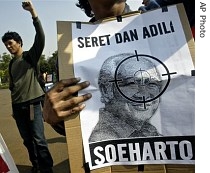2007年VOA标准英语-Indonesia Faces Challenges in Fight Against Cor(在线收听)
Jakarta, Indonesia
14 June 2007
Indonesia is struggling to rein in corruption and money laundering among its businesses and branches of government. But, as Chad Bouchard reports from Jakarta, government and private anti-corruption agencies say they are fighting an uphill battle.
A recent survey by Transparency International, the world anti-corruption watchdog, indicates that Indonesia is considered among the most corrupt countries in the world.
 |
| Indonesian protesters call for former Indonesian dictator Suharto to be put on trial in Jakarta, Indonesia, 12 July 2006 file photo |
"Probably he's one of the most corrupt and rich former presidents in the world. I think there should be a way to go after Suharto and his assets, but we have given him so much time. If we want to fight corruption consistently, we are not giving good signals to society."
Mr. Suharto was indicted in 2000 on charges of embezzling $600 million in state funds, but has failed to appear in court, saying he's too sick to stand trial.
His son, Tommy Suharto, served a fraction of a 15-year sentence for paying two hit men to murder a Supreme Court judge.
Anti-corruption activists say Indonesia also faces widespread corruption in its courts, where judges often accept bribes for a favorable decision.
Amien Sunaryadi, the vice-chairman of Indonesia's Corruption Eradication Commission, says police in Indonesia lack key investigative tools such as search and seizure, undercover operations and computer surveillance. He says those techniques could also be used to determine if judges or prosecutors are taking bribes.
"The methods in investigating white collar crime in Indonesia is not proper," he said. "Because of the investigation methods are not proper, law enforcement agencies not able to prove corruption that happen within the judiciary."
Sunaryadi adds that, in Indonesia, court proceedings are not transcribed, so there is no way to review trials or gather evidence of corruption in the judiciary.
He says that, over the last 30 years, only two judges have been convicted on corruption charges.
Indonesia is currently negotiating an extradition treaty with Singapore to allow corrupt officials and millions of dollars in illegally obtained funds to be returned to Indonesia.